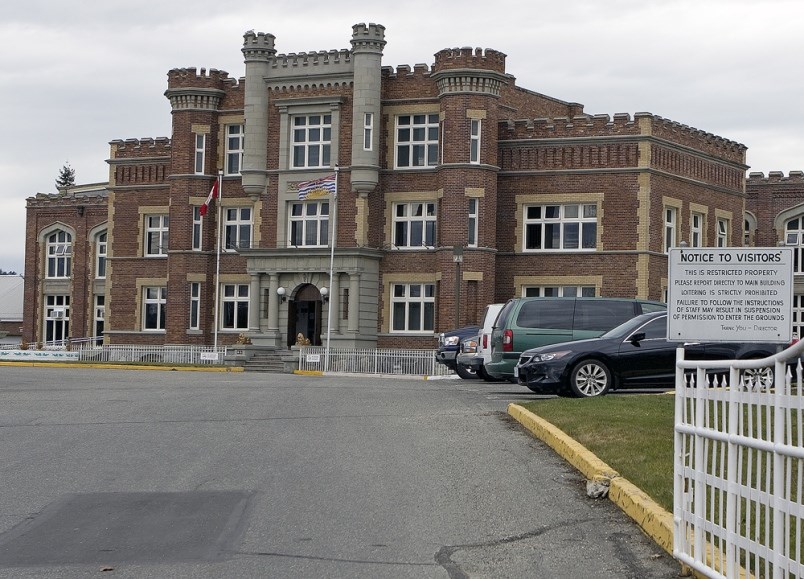More people leaving B.C.’s jails will have access to a transition team to help them get the mental health and substance support they need when returning to their communities.
The Community Transition Team program, already in place in five correctional centres, is being expanded to all 10 provincial facilities, including the Vancouver Island Correctional Centre in Saanich.
Sheila Malcolmson, B.C.’s minister for mental health and addictions, made the announcement Monday from the Saanich jail. She said the expansion will “help even more [people] access mental health and substance use care following their release from prison.”
The Mental Health and Addictions Ministry is also increasing the size and the capacity of community transition teams, and making them available to people for 90 days after they leave jail, up from 30. The teams will include social workers, nurses, peer support workers and Indigenous patient navigators, Malcolmson said.
The expanded teams will connect people to services such as mental health and substance use treatment, after-hours crisis response and psychiatric clinical, social supports, according to the ministry.
“When a person is released from a correctional facility, the days and weeks following are crucial,” Malcolmson said.
“We really want to ensure a safe and successful transition back into community,” she said. “But people being discharged from prison face so many challenges from navigating health care to getting a roof over their heads.”
After being released people with substance-use challenges are 12 times more likely than the general population to die of toxic drug overdose, she said.
“We know also that without proper mental health and substance use support, people are much more likely to re-offend,” Malcolmson said. “That’s bad for communities and bad for people that have been caught in a cycle of reincarnation.”
Steve Pelland said he gravitated toward drugs and alcohol in his youth, became a daily opioid user, overdosed several times, and found himself in and out of jail over two decades.
“I’ve tried many many times to get sober,” he said. Two years ago while in custody, he again wanted to try to make a change.
Pelland said he connected with a social worker, a concurrent disorders counsellor and a peer support worker on the Community Transition Team. As soon as he was released, he was taken to a treatment centre, the non-profit Phoenix Society drug and alcohol recovery centre.
He said he was helped, felt like he had a team behind him, and didn’t feel judged. “Now I’ve been clean and sober for two years, I’m doing well and I have the beginnings of a career,” Pelland said. He begins work Tuesday as a peer support worker with the same team.
Asked where people would be sent for treatment, given stretched resources and reports of long waits to get into facilities, Malcolmson didn’t directly answer the question.
Instead, she said sometimes the help needed is as simple as transportation to access health and housing appointments, or being reminded to take medication.
B.C. Liberal Leader Kevin Falcon criticized Monday’s announcement as just another NDP pledge at a time when the health care system is crumbling.
“A year from now, let’s look back and see what results we got out of this announcement,” Falcon said during a media availability. “I can pretty much guarantee it’ll be exactly mirroring the results that we’ve been seeing on the streets.”
B.C. is seeing the highest rates of overdose deaths in the history of the province, he said.
“We’ve got total social chaos — not just in the Downtown Eastside of Vancouver, which is absolutely an international embarrassment — but in other communities right across this province,” Falcon said.
A Liberal government would go in a “dramatically different direction because I know that doing more of the same will not get us different results,” he said.
Public Safety Minister Mike Farnworth said the government has been working to build a comprehensive system of mental-health and addictions services to get people the help they need and create safer communities.
Asked about the ability to deliver on some of the 28 recommendations in a report on prolific offenders released Saturday — including treatment services in the community — Farnworth said the government will go through the budgetary process to determine the kind and number of resources required.
The five new Community Transition Teams will serve people leaving the Alouette Correctional Centre for Women, Ford Mountain Correctional Centre, North Fraser Pretrial Centre, Okanagan Correctional Centre and Vancouver Island Regional Correctional Centre.
Transition teams for people leaving Surrey Pretrial Services Centre, Prince George Regional Correctional Centre, Kamloops Regional Correctional Centre, Nanaimo Correctional Centre and Fraser Regional Correctional Centre have been in place since 2019.



